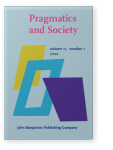Discourse markers as indicators of connectedness between expositive illocutionary acts
There has been consistent interest in discourse makers over the past couple of decades, and various proposals have
been put forth regarding their functions. The present paper analyzes discourse markers in general as indicators of types of
connectedness between expositive illocutionary acts (Austin [1962]1975), which bring
about illocutionary effects in discourse. The discourse marker well in particular indicates a gap between the
preceding expositive illocutionary act and the present one, signaling the present expositive illocutionary act is of a
non-committal type. This gap is analyzed, depending on the types of the preceding and present expositive illocutionary acts, as
divergence, hesitancy, a transition from one expositive illocutionary act to another, or a boundary between them.
Article outline
- 1.Introduction
- 2.Discursive illocutionary acts
- 2.1Expositive illocutionary acts (Austin 1975)
- 2.2The characterizations of expositive illocutionary act types
- 3.Discourse markers as indicators of the connectedness between the preceding expositive illocutionary act and the present one
- 3.1The discourse marker but
- 3.2The functions of the discourse marker well
- 4.Conclusion
- Acknowledgements
- Notes
-
References
References
Aijmer, Karin
2013 Understanding Pragmatic Markers: A Variational Pragmatic Approach. Edinburgh: Edinburgh University Press.

Austin, J. L.
[1962] 1975 How to Do Things with Words. Oxford: Oxford University Press.

Austin, J. L.
[1961] 1979 Philosophical Papers. Oxford: Oxford University Press.

Blakemore, Diane
2002 Relevance and Linguistic Meaning: The Semantics and Pragmatics of Discourse Markers. Cambridge: Cambridge University Press.


Bolinger, Dwight
1989 Intonation and its Uses: Melody in Grammar and Discourse. Stanford: Stanford University Press.

Caffi, Claudia
2007 Mitigation. Amsterdam: Elsevier.

Carter, Ronald and Michel McCarthy
2006 Cambridge Grammar of English: A Comprehensive Guide. Cambridge: Cambridge University Press.

Fetzer, Anita
2006 “
‘Minister, we will see how the public judges you.’: Media references in political interviews.”
Journal of Pragmatics 381: 180–195.


Fischer, Kerstin
(ed) 2006 Approaches to Discourse Particles. Amsterdam: Elsevier.

Jucker, Andreas H.
1993 “
The discourse marker well: A relevance theoretical account.”
Journal of Pragmatics 191: 435–52.


Norrick, Neal R.
2001 “
Discourse markers in oral narrative.”
Journal of Pragmatics 331: 849–78.


Mey, Jacob
2001 Pragmatics: An Introduction 2nd ed. Oxford: Blackwell.

Oishi, Etsuko
2014 “
Evidentials in entextualization.”
Intercultural Pragmatics 11(3): 437–62.


Oishi, Etsuko
2017 “
Illocutionary effects, presupposition, and implicature.” In
Pragmatics at its Interfaces, ed. by
Stavros Assimakopoulos, 71–88. Boston/Berlin: Walter de Gruyter.


Oishi, Etsuko and Anita Fetzer
2016 “
Expositives in discourse after discourse”
Journal of Pragmatics 961: 49–59.


Östman, Jan-Ola
1995 “
Pragmatic particles twenty years after.” In
Organization in Discourse: Proceedings from the Turku conference, ed. by
Brita Wårvik,
Sanna-Kaisa Tanskanen, and
Risto Hiltunen, 95–108. Turku: University of Turku.

Schiffrin, Debora
1987 Discourse Markers. Cambridge: Cambridge University Press.


Schourup, Lawrence
2001 “
Rethinking well
.”
Journal of Pragmatics 331: 1026–60.


Searle, John R.
1979 Expression and Meaning: Studies in the Theory of Speech Acts. Cambridge: Cambridge University Press.


Cited by
Cited by 1 other publications
Oishi, Etsuko
2021.
Inquiries in Philosophical Pragmatics [
Perspectives in Pragmatics, Philosophy & Psychology, 27],
► pp. 63 ff.

This list is based on CrossRef data as of 27 april 2021. Please note that it may not be complete. Sources presented here have been supplied by the respective publishers.
Any errors therein should be reported to them.
